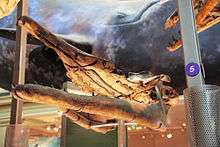Llanocetus
| Llanocetus Temporal range: Priabonian | |
|---|---|
 | |
| Skull of Llanocetus denticrenatus at the Smithsonian Museum of Natural History | |
| Scientific classification | |
| Kingdom: | Animalia |
| Phylum: | Chordata |
| Clade: | Synapsida |
| Class: | Mammalia |
| Order: | Artiodactyla |
| Infraorder: | Cetacea |
| Parvorder: | Mysticeti |
| Family: | †Llanocetidae Mitchell 1989 |
| Genus: | †Llanocetus Mitchell 1989 |
| Species[1] | |
|
L. denticrenatus Mitchell 1989 | |
Llanocetus (“Llano's whale”) is a genus of extinct baleen whales from the Priabonian (Late Eocene) of Antarctica. Its fossilized remains were discovered on Seymour Island in the Antarctic Peninsula, within La Meseta Formation.[2]
The remains — a partial skull — were described in 1989 by Edward D. Mitchell, who argued they belonged to a medium-sized whale which shared traits of both archaeocetes and mysticetes:[2] it carried a wide, flat, and dorsoventrally flat rostrum, its jaw had heterodont teeth separated by wide diastemata, and the cheek teeth were two-rooted and palmated with accessory denticles. Additionally, fine grooves around the alveoli indicate the palate had a rich blood supply.
Mitchell interpreted Llanocetus as a basal mysticete with filter feeding behaviour, probably feeding on euphausiids or similar small animals.[3] The sediments within which the fossil was found seems to indicate a lagoonar environment.[4]
Mitchell created for the specimen the new monotypic family Llanocetidae, as well as the new monotypic genus Llanocetus and the species L. denticrenatus. The three new taxa were dedicated to the American biologist George A. Llano.[1]
References
Bibliography
Mitchell, E. D. (1989). "A new cetacean from the Late Eocene La Meseta Formation, Seymour Island, Antarctic Peninsula". Canadian Journal of Fisheries and Aquatic Sciences. 46: 2219–2235. doi:10.1139/f89-273.
External links
Llanocetus page on Fossilworks.org